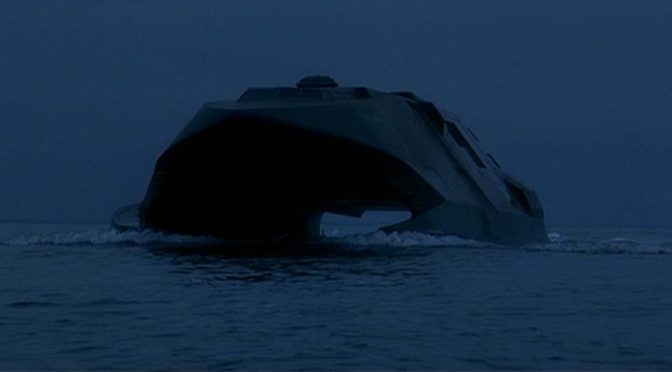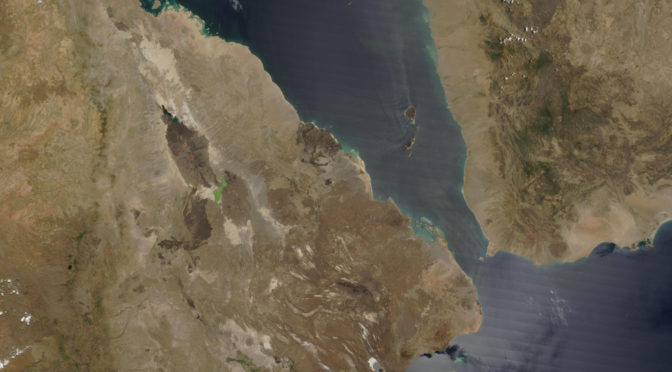Chokepoints and Littorals Topic Week
By Capt. John Holmes, USMC
“Words are the new weapons, satellites the new artillery… Caesar had his officers, Napoleon his armies, and I have my divisions: TV, news, magazines” –Elliot Carver to James Bond
It’s a strange time in America, and the world at large. Like many Americans during this odd and stressful time, I’ve turned to popular media to take a break from the unrelenting confusion and fear of daily life. One of my favorite pieces of escapism comes in the form of the celluloid adventures of a certain British secret agent codenamed 007, James Bond. My cinematic reveries were interrupted when it became apparent that 1997’s Tomorrow Never Dies, starring Pierce Brosnan as the titular hero, was a lot closer to our current reality than I had ever expected. Themes of great power competition, technological proliferation, state and non-state conflict, media manipulation, and conflict in the strategic waterways and littorals, which may have seemed somewhat out of place in 1997, feel all too prescient in 2020. If the British forces in the film were instead American, then the film makes for a worrisomely plausible prophecy of disaster.
Over a nearly 75-year long career, James Bond has faced KGB assassins, Voodoo priests, ninjas, space hijackers and everything in between. In Tomorrow Never Dies he faces off against…a newspaper publisher. Bond’s adversary in this film, the vicious media baron Elliot Carver (a somewhat frothing caricature of Rupert Murdoch, Ted Turner, and their peers), was indeed mocked as an unlikely or unimposing adversary when the film first premiered. However, he may actually be the most realistic and dangerous adversary Bond has ever faced. While Carver has the requisite heavily armed thugs, ruthless henchmen, and even a stealth boat, these are all largely theater. Carver’s true weapon is information. Control of information represents control of the single greatest resource available. Unlike other resources, information is both a weapon and the battlefield upon which current and future conflicts will play out.
When Tomorrow Never Dies was released, it was much derided, as it seemed that the end of the Cold War left James Bond and those like him without a clear adversary. This actually mirrors the prevailing sentiment of the time, when political scientists around the world were musing about the “End of History” and the “Clash of Civilizations” as opposed to nation-state rivalry and “Great Power Competition” which had shaped the preceding centuries. Despite those optimistic predictions, we find ourselves in a new phase of competition in which the balance of power is becoming increasingly fragile. Compared to the existential threats of the Cold War, Carver’s plan to provoke a war between England and China in order to secure media rights and access to the Chinese market was lampooned as being an unlikely take on the sort of “Yellow Journalism” pedaled by William Randolph Hearst and others prior to the Spanish-American War. In a rather heavy handed moment, Carver even utters Hearst’s famous line “You give me the pictures, and I’ll give you the war.”
In 1997, reviewers and commentators doubted that anyone would be willing to risk a war merely for the sake of ratings. In 2020, every major event, and even most minor ones, is spun in the hopes of increasing the viewership, reach, or influence of some media outlet or another. What was a novel and somewhat unrealistic prospect 23 years ago is today simply the way of the world. Beyond the quest for viewers, followers, likes and so on, modern-day “Great Powers” seek to avoid actual combat while directly and aggressively competing through all other means. Long before triggers are pulled, and even before troops are deployed, the conflict is being waged through all other instruments of national power: diplomatic, economic, and informational. The information environment is a key battleground in which both nation-states and non-state actors, such as Carver’s media empire or home-grown terror and criminal networks, wield nearly equal powers. In this unique environment, non-state actors may have the greater advantage due to a lack of accountability and face few consequences for their actions. Zero accountability, wielded by a nation-state’s proxies, a non-state actor, or even an individual is a powerful weapon. The information environment is the only place where a small group of actors can have such an outsized influence with relative impunity.
Carver’s media empire, encompassing all forms of media available at the time, is portrayed near the start of the film in a memorable character introduction scene. As the scene unfolds his executives and department heads provide an almost comically villainous commentary outlining the next day’s top stories, which include sensationalist reports of war, natural disaster, and civil unrest. Various members of Carver’s team are directed to blackmail prominent heads of state and to accept payment for spreading rumors about Mad Cow Disease. All of this occurs interspersed with scenes of Carver gleefully creating headlines for events that have not happened yet; events which he himself is secretly orchestrating. Of particular interest to Carver is the inciting incident of the film: the sinking of a British destroyer in the South China Sea, and the downing of a Chinese MiG by Carver’s agents in the hopes of stirring up conflict on the eve of the launch of his new satellite network.
Part of Carver’s animosity toward the Chinese comes from the Chinese government refusing to grant him broadcast rights on the mainland. This reflects the Chinese government’s continued real world quest to control all media, within their own borders, and throughout the world at large as well. Due to the Chinese government’s aggressive censorship of the truth, it has become a running joke on the internet that “nothing happened” at Tiananmen Square on June 4, 1989. In 1997, China was powerful enough to deny broadcast rights to a media conglomerate like the Carver Media Group or its real-life counterparts, but not quite powerful enough to ensure that the offending organization would bend to its will. As the last decade or so of Hollywood kowtowing to China has demonstrated, that era has ended.
Control of information and control of the physical realm go hand in hand. Without information access, there can be no physical access. In previous centuries, this took the form of flattering and paying tribute to local rulers or even the outright theft or seizure of maps and navigational charts. In 2020, the information environment is much more complicated. The interplay of traditional media, social media, internet proliferation, and public diplomacy represent the tenuous balance of power and access in which both nation-states and non-state actors have to navigate through. By comparison, physical navigation through strategic chokepoints seems easy! Carver was ahead of the curve in his realization and understanding of the power of information.
A specific criticism of Carver’s plan in Tomorrow Never Dies is his reliance on traditional media, and later reviewers have argued that in the days of the internet, Carver’s plans would have fallen apart. Of course, these reviews either pre-date or are willfully ignorant of the era of “fake news,” in which incorrect, inaccurate, and/or manipulated information can assume a life of its own. Today it is more than believable that certain media outlets would only require slight nudging for an individual like Carver to achieve his goals. Even if Carver and his plans were fully and directly exposed to the general public (spoilers: they are not), a dedicated cadre of internet dwellers would likely absolve him of any responsibility. Remember that, today 500 years after Ferdinand Magellan circumnavigated the globe, there is a persistent, vocal minority which maintains that we have all been lied to and the earth is flat. If anything, the internet and social media would only make Carver more powerful.
Another relic of the period in the background of Tomorrow is concern over U.S.-Vietnam relations. When, for example, the CIA assists Bond and his Chinese counterpart Wai Lin (played by the incomparable Michelle Yeoh) parachute into the area where the British destroyer sunk, the Americans are greatly concerned about the risk of any equipment with U.S. markings washing ashore in Vietnam. In their defense, the filmmakers could never have guessed that the U.S. and Vietnam would achieve a rapprochement due to their mutual distrust of and competition with China. Infamously, China’s claims in the South China Sea, in which they claim exclusive shipping, fishing, and mineral rights, extend to just outside of Vietnam’s territorial waters. Chinese manmade islands, complete with garrisons, continue to crop up in order to further cement these claims. A theme of the film, which is and will continue to be a critical facet of competition and influence in the littorals and strategic waterways, is the idea of strange bedfellows. A British agent working hand-in-hand with a Chinese one was unusual in 1997, and borderline unheard of in 2020. Instead, the ongoing great power competition will, and must, take on an almost 19th century-esque balance of temporary, regional, and unexpected alliances.
Somewhat amusingly, the aforementioned parachute entry is launched from a “U.S. airbase in the South China Sea,” which an onscreen map reveals to be Okinawa. It wasn’t too long ago that Okinawa was a considered a strategic backwater by both the U.S. and Japan. Now, it has become critical to both U.S. policy and international strategy in the Western Pacific. What’s old is new again, in ways that the originators could hardly imagine. Just recently the U.S. started promulgating the doctrine of expeditionary advanced base operations (EABO) and littoral operations in a contested environment (LOCE), last made famous as key components of the Pacific Campaign during the Second World War. Similarly, the concept of control of strategic chokepoints and influence in the littorals is not new either. It was a major feature of both wars and peace in the 18th and 19th centuries and only really fell out of focus at the end of the Cold War.
Some things do, however, change. Tomorrow Never Dies is often cited as one of the more technology heavy James Bond films, and with good reason. Technological advancement and proliferation is such a major feature of our daily life that it can be exhausting trying to keep up with the latest and greatest devices. A passion for the newest and most high-tech gadgets was a big part of the 1990s and Tomorrow Never Dies is definitely representative of this trend. MI6’s long suffering gadget master Q presents 007 with a 90s-era Nokia cellphone which could, among other things, copy fingerprints, pick locks, stun adversaries, and remotely drive his car. Other than fully displaying Hollywood’s fascination in the 90s with gadgets and technologies, this served as a metaphor for the oncoming prevalence and dominance of technology. In 1997, cell phones were still fairly new to the general public. Perhaps the filmmakers got the application wrong, but they were definitely on to something with the power of a cell phone in one’s pocket.
In the opening sequence of the film, Bond surveils a weapons bazaar on the Russian border. Eventually, Bond must intervene to ensure that an airstrike does not accidently trigger a pair of nuclear torpedoes. In the ensuing chaos, one of Carver’s more unassuming henchmen, Henry Gupta, escapes. Touted as one of the world’s top “techno-terrorists,” Gupta makes off with a GPS encoder which, when compared to the recovery of the nuclear weapons, is considered a minor loss. The folly of this is assumption is soon made apparent. Carver uses his satellite network to spoof Royal Navy GPS signals causing a British destroyer to wander into Chinese territorial waters. The destroyer is then buzzed by Chinese MiGs which order the ship to turn back. The British sailors check the GPS signal, which displays a false position, and assume that the Chinese are posturing. It was probably unnecessary for Carver’s henchmen to then manufacture a crisis by sinking the destroyer and shooting down one of the MiGs, as tensions were already high.
GPS spoofing or jamming was a novel concept in the late 1990s. Most considered the risk to consist of nothing more than getting units lost or mass formations being unable to coordinate. In the last few years, however, it has become a significant concern in areas of competition such as the Baltic Sea, the North Sea, and of course the South China Sea. In 2020 this type of interference is performed by nation-states or third parties acting on behalf of nation-states. Consider, however, the Chinese territorial claims mentioned above, and the tendency of both Russian and Chinese aircraft to buzz U.S. and partner nation ships and aircraft. Such situations could easily and quickly escalate. It would likely not take the presence of a hostile stealth boat to tip ongoing tensions into open conflict; just a nudge in the right direction. With appropriate spoofing, both sides could have justifiable grievances; one arguing that their territorial sovereignty was violated and the other using position reports to contest that fact.
Carver’s ultimate weapon is information, not his stealth ship, or later, his stolen missiles. As quoted above, he views satellites as “…the new artillery.” It is the launch of his worldwide satellite network which serves as the background against which he instigates a conflict between China and Britain. Carver’s private satellite network, and its ability to communicate with the entire world, is portrayed as somewhat momentous and vaguely sinister while simultaneously being entirely plausible and slightly banal. This is far cry from the previous film in the series, in which a satellite weapon designed by the Soviet Union functions as a doomsday device. It was not long ago that satellite launches were exclusively the provenance of nation-states. Today, any company, group, or individual with the appropriate means can contribute to the increasingly crowded skies. With no real way to monitor what is in orbit or what capabilities these satellites have, the potential for control, communications, surveillance, interference, and any number of benevolent or nefarious actions is nearly unlimited. Bond probably didn’t realize how correct he was when he flippantly identified satellite networks as an incredible tool for disinformation.
One of the more unbelievable aspects of Tomorrow Never Dies is that Carver elects to conduct his final operations aboard his stealth ship, in hope of witnessing the start of a war between China and England. While this fits with his megalomaniacal personality, it’s very unlikely that he would be willing to risk even minor discomfort, let alone his potential death at the hands of a British secret agent. He easily could have (and as it turns out should have) observed the operation from his headquarters in Germany or his local affiliate in Ho Chi Minh City (referred to as Saigon in the film). As a media mogul and technologically savvy individual, Carver should have known that control and influence no longer require a physical presence. While a physical presence is an excellent way to monitor a nation-state’s interests, it is hardly cost effective in all cases and represents only part of the battle. If access is the goal, then the majority of the action must happen miles away, in the information environment.
Hopefully, the age of mercantilist skirmishes on the high seas to control access and resources are over. At the current moment, China’s only aircraft carrier routinely conducts patrols in the South Pacific to great fanfare every time it leaves port, never mind the fact that U.S. aircraft carriers and other warships are almost constantly stationed in this area. The purpose of having carriers and other ships in that region, and most other regions of the world, is not to directly contest with the ships of other navies, but rather to project a presence. No nation has the ability to station troops and assets around the world at all times in sufficient force to directly control its interests. By contrast, competition and influence through information and technology is bargain-priced. For far less than the cost of a carrier strike group, a nation or individual can exert an extremely outsized influence without ever having to set foot in the contested region. When Carver smugly declares that he desires “worldwide domination,” this is what he means. While 30 years ago that might have meant shattering armies and planting flags in opposing capitals, in 2020 he who controls the information controls the world.
By the time competition in the littorals and strategic waterways devolves into active combat, the majority of the fighting has already occurred outside of the physical realm. Tomorrow Never Dies demonstrates just how little it may take to push us in that direction. A slightly amoral media outlet looking to make a point may have a significant impact on the world even if they aren’t as openly villainous as Carver. In the end, Carver’s most imposing henchmen are not the gun-toting goons, but rather the media department heads who appear only briefly at the beginning of the film. They represent an interplay of information, media, and technology which not only shapes public opinion but also creates it.
In a time when people are more interconnected than ever, the power of information is paramount. Information is both the current battlefield and the most precious global commodity. There can be no freedom of physical navigation without freedom of operation in the information environment. By the end of Tomorrow Never Dies, even the good guys seem to have learned this lesson, as Bond’s boss dictates a press release announcing Carver’s death in a “boating accident.” We must understand that the confluence of competition in the littorals and strategic waterways along with the competition in the information environment run together to create an increasingly tenuous balance of power between the great powers. And while we may not always have a gentleman-spy to help us navigate away from a potential disaster, there are more than a few media outlets and information brokers, both state and non-state, who seek to profit by steering us in the opposite direction.
Captain Holmes is an Assault Amphibian Vehicle Officer and Psychological Operations Officer assigned to II MEF Information Group and currently attached to the 22d MEU/SPMAGTF CR-AF. Previous assignments have included both the First and Third Marine Divisions. The views expressed here are his own and do not represent those of the U.S. Marine Corps, the Department of Defense, or the U.S. government.
Featured Image: Elliot Carver’s stealth ship from “Tomorrow Never Dies” (via jamesbond.fandom.com)




